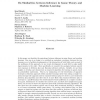Free Online Productivity Tools
i2Speak
i2Symbol
i2OCR
iTex2Img
iWeb2Print
iWeb2Shot
i2Type
iPdf2Split
iPdf2Merge
i2Bopomofo
i2Arabic
i2Style
i2Image
i2PDF
iLatex2Rtf
Sci2ools
127
click to vote
JAIR
2008
2008
On Similarities between Inference in Game Theory and Machine Learning
In this paper, we elucidate the equivalence between inference in game theory and machine learning. Our aim in so doing is to establish an equivalent vocabulary between the two domains so as to facilitate developments at the intersection of both fields, and as proof of the usefulness of this approach, we use recent developments in each field to make useful improvements to the other. More specifically, we consider the analogies between smooth best responses in fictitious play and Bayesian inference methods. Initially, we use these insights to develop and demonstrate an improved algorithm for learning in games based on probabilistic moderation. That is, by integrating over the distribution of opponent strategies (a Bayesian approach within machine learning) rather than taking a simple empirical average (the approach used in standard fictitious play) we derive a novel moderated fictitious play algorithm and show that it is more likely than standard fictitious play to converge to a payoff-...
Related Content
| Added | 12 Dec 2010 |
| Updated | 12 Dec 2010 |
| Type | Journal |
| Year | 2008 |
| Where | JAIR |
| Authors | Iead Rezek, David S. Leslie, Steven Reece, Stephen J. Roberts, Alex Rogers, Rajdeep K. Dash, Nicholas R. Jennings |
Comments (0)

